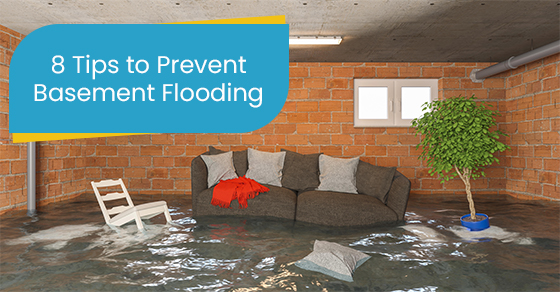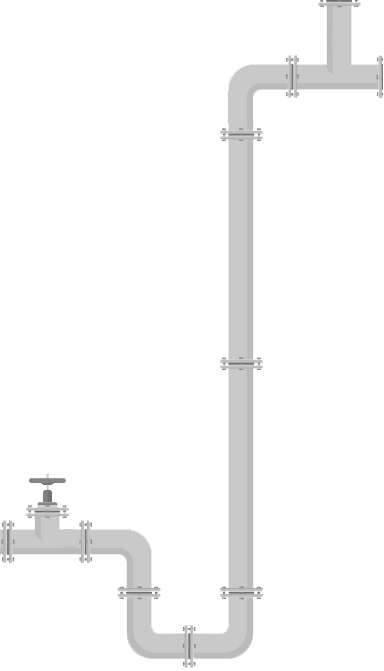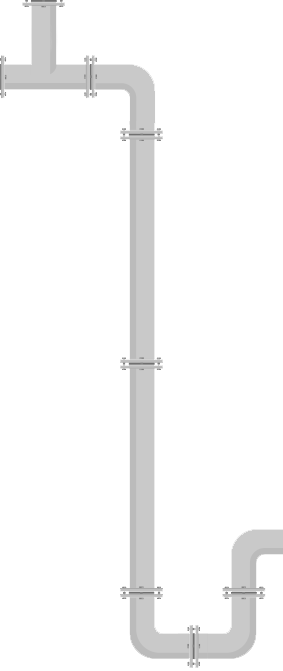8 Tips to Prevent Basement Flooding
Posted by Jason Genah on 08-02-2023

Basement flooding is a common phenomenon. Basements are often constructed well below the water table of the neighborhood; once winter is over and the snow melts, water tables rise. Without proper basement drainage, there is a chance that your basement will get flooded. You can avoid flooding by being aware of common causes and how to fix them.
You should also be careful if your basement has a hot water tank with a drain under it. The same goes for having a washing machine drain or bathroom drainage at the lowest level.
Check any valves or installations that may cause a leak. With basement toilets, ensure there is proper drainage and clear out pipes. Always check for signs of leakage or blockage.
Protect Your Basement Before any Leakage Happens
Ideally, your basement should remain dry year-round. If you are experiencing seepage, you need a plan to protect your basement from flooding and receiving permanent damage.
Taking necessary precautions at the right time goes a long way in saving money and preparing yourself from any unprecedented disasters.
Understand Your Plumbing
All homeowners are responsible for their own piping and plumbing within their property line. You should always hire a licensed plumber for specialized testing and inspections. It helps in understanding how the pipes and drainage of your home are aligned.
Having the plumber tell you what areas to pay attention to is a great way to know what areas need preventative maintenance. It allows you to develop a plan in case flooding happens in unfortunate situations.
Seal Your Basement
Sealing all the cracks and openings in your basement is the best way to avoid any possible flooding. It also involves weatherstripping around all doors and getting your windows caulked. In most cases, home insurance does not cover flooding from surface or groundwater through seepage, cracks, or holes in your foundation. Thus, the best way to protect yourself is to seal visible openings so that it does not result in flooding.
Grade Your Lawn Properly
Check if the lawn around your foundation slopes toward the house instead of away from the house. If your lawn slopes towards the house, then you may be at risk of basement flooding. Rainwater pooling close to the home’s foundation causes water to seep through openings.
To avoid this, grade your lawn to drain away from the house. It will allow water to flow away from your walls and run into municipality gutters. Landscaping your lawn by realigning its height to fix improper drainage is a good decision in saving your basement.
Install a Sump Pump and Backwater Valve
Install a sump pump to remove water out of a flooded basement. If your basement is prone to flooding, installing it can keep the damage to a minimum. Generally, electricity powers sump pumps. However, you can consider getting a battery-operated one for automatic drainage.
Further consider installing a backwater valve which closes off the drain to the general sewer lines. Backwater valves prevent sewage from entering your home via other drains like toilets or sinks.
Avoid Pouring Oils and Grease Down the Drain
Fats, oils, and grease from the food in your kitchen sink can cause a sewage buildup. This blockage causes issues in the long run. The grease tends to solidify and accumulate in your pipes causing a blockage.
While it seems deceptive because the grease looks like a liquid, this liquid solidifies as it cools. It creates a blockage in your pipes and drainage networks. Some people feel flushing down grease using hot water eliminates this risk. However, that is not true. Over time, it will cause your pipes to burst or damage the plumbing causing more expenditures.
Maintain all the Eavestroughs and Downspouts
One way to ensure proper water drainage from your roof is to maintain your eavestroughs and downspouts. Check that they are free from debris like leaves, twigs, dirt, or sludge. Blocked eaves and downspouts result in water filling up and spilling over. Water can then collect in areas close to the foundation of your home. Over time, this causes seepage and flooding.
Clean all the Gutters in Spring and Fall
Leaves and sticks always tend to build up in your gutters. If you are not regularly cleaning them out, you risk flooding your home. Your basement will tend to attract water as it is the lowest point in your home. Also, all drainage pipes lead to it.
Having your pipes and gutters clear will ensure a smooth water flow eliminating puddling. During heavy rains, blocked gutters drain slowly. This forces water to dump directly into the foundation that lines the perimeter of your home.
Contact the Professionals
If you are considering how to tackle a flooding situation in your home or want to assess if you are at risk, visit Drain King Plumbers for a home evaluation.
If you’re in need of an emergency plumber in Vaughan, contact Drain King Plumbers. You can book an appointment at 833-983-5663. Visit our website here to discover more details about our different drainage clearing services.




